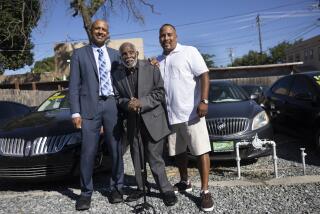Missing out on plea bargains
- Share via
An estimated 95% of criminal charges are resolved through plea bargains, so an incompetent lawyer at the plea stage can harm his client just as much as an attorney who bungles a trial. The Supreme Court has been asked to restore the terms of plea bargains that two defendants did not accept because of lawyer malpractice. The cases give the justices an opportunity to enforce fairness in the legal system at every level.
In 2007, Galin E. Frye was charged by the state of Missouri with driving with a revoked license, a felony because he had several previous convictions. The district attorney offered Frye’s lawyer a plea bargain under which Frye would serve only 90 days in prison. The lawyer, however, didn’t inform Frye of the offer, and Frye ultimately pleaded guilty and received a three-year sentence.
The second case stemmed from a 2003 incident in which Anthony Cooper shot a woman in her buttock and thighs, causing serious injuries. Prosecutors offered Cooper’s lawyers a plea deal in which he would serve a minimum sentence of 51 to 85 months. Cooper turned down the offer because his attorney inaccurately (and bizarrely) told him that he couldn’t be convicted of intent to murder because his victim was shot below the waist. Cooper went to trial, was convicted and was sentenced to 185 to 360 months.
At oral arguments last week, some justices suggested that such errors were harmless if the defendant subsequently received a fair trial. But, as Cooper can attest, that’s not true: Mistakes of this sort can be extremely harmful. Justice Elena Kagan succinctly summed up the injustice of penalizing defendants for the blunders of their lawyers: “Here the person is sitting in prison for three times as long as he would have been sitting in prison had he had effective assistance of counsel at the plea-bargaining stage.”
The criminal justice system would grind to a halt if every defendant insisted on his right to trial. But even those who regard plea bargains as a necessary evil must acknowledge that they should be fair.
In a 1984 decision, the court defined ineffective assistance of counsel this way: “First, the defendant must show that counsel’s performance was deficient. This requires showing that counsel made errors so serious that counsel was not functioning as the ‘counsel’ guaranteed the defendant by the 6th Amendment. Second, the defendant must show that the deficient performance prejudiced the defense.” Those conditions are clearly met when an attorney fails to tell a client about a favorable plea offer or discourages him from accepting one on the basis of false information. The Supreme Court should so rule.
More to Read
A cure for the common opinion
Get thought-provoking perspectives with our weekly newsletter.
You may occasionally receive promotional content from the Los Angeles Times.









